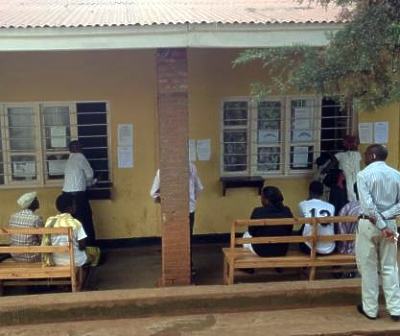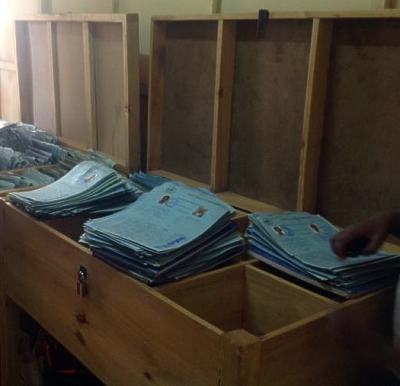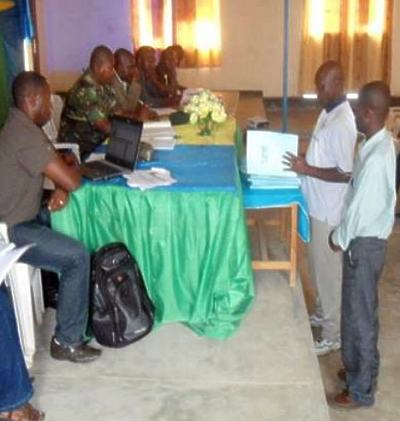 An Umurenge financial institution being opened in the Rwandan province of Bugarama © Orinfor/Rwanda govt/afrol NewsEconomy - Development | Society Rwanda succeeds including citizens in formal financial sector
The Rwandan government has set a target of 90 percent financial inclusion by 2020 and the evidence of progress toward this goal is everywhere, according to World Bank research analyst Douglas Randall, who is "impressed by the financial inclusion landscape in this country."
"As is often the case, impressive headline numbers mask considerable complexity," Randall says. "What we saw were impressive institutions run by dedicated staff, many of them in places where you would be hard pressed to find a bank. Yet the challenges were clear," he explains. An Umurenge office in the rural Kamonyi district in Rwanda's Southern Province basically could tell a success story of public participation. The manager said that his chief concern was dealing with the inefficiencies and risks associated with running a 5,700-member cooperative on a paper-based system. There were dozens and dozens of wooden boxes filled with members' files in a back room, as the planned computerisation of the Kamonyi had not yet started. With only paper files, the cooperative is constrained by a lack of interoperability and network connectivity. A member of one SACCO cannot withdraw his or her money from another SACCO or ATM. So traders travelling to the capital, Kigali, to do business must withdraw money from their local SACCOs and carry a wad of cash - "the type of inefficient and potentially dangerous outcome that the formal financial sector is meant to ameliorate," Randall notes. Also, the cooperative in Kamonyi that close to half the savings accounts had not been accessed in the past six months. This trend could, according to Randall, be linked to the FinScope finding that 26 percent of SACCO members reported having joined because they felt that they were obliged to. The office was also struggling to reach the very poorest of citizens: Only 3 percent of SACCO members are from the lowest income category. Further, qualitative evidence was suggesting that SACCO loans often could not be disbursed quickly enough to meet the short-term consumption or emergency credit needs of rural Rwandan customers. According to the World Bank team, the rural Umurenge offices needed
But all in all, Randall and his colleagues found evidence of large popular participation in this rural finance project. The World Bank is set to assist the Rwandan government and Umurenge to professionalise the service, especially with a much needed computerisation and by training local staff. Rwanda takes African lead Rwandan authorities seem committed to achieving their ambitious targets of a 90 percent financial inclusion rate within few years. And with this, Rwanda is taking the lead on the entire African continent, where only 23 percent of the adult population has a bank account, according to World Bank data. There is a great need for formal financial services in sub-Saharan Africa, where over 40 percent of the population is saving or setting aside money regularly, but only half of these have a formal service at their disposal. The penetration of formal financial services is particularly low in North and in Central Africa, while financial inclusion is much higher in Southern Africa and picking up in Western and Eastern Africa. The highest rate of adults with an account in a formal financial institution in Africa is found in Mauritius (80 percent) and South Africa (54 percent), followed by Kenya, Mozambique, Zimbabwe, Angola and Morocco (all around 40 percent. Kenya is among the countries which have a particular and successful financial inclusion policy, where mobile phone banking has become the backbone of success. But there are also 14 African countries where 10 percent or less of the adult population has a bank account, including populous countries such as Egypt, according to World Bank data. In Niger, only 2 percent of the population has a bank account, and in the Central African Republic, Congo Kinshasa and Guinea, less than 5 percent of adults have access to financial services. By staff writer © afrol News - Create an e-mail alert for Rwanda news - Create an e-mail alert for Economy - Development news - Create an e-mail alert for Society news
On the Afrol News front page now
|
front page
| news
| countries
| archive
| currencies
| news alerts login
| about afrol News
| contact
| advertise
| español
©
afrol News.
Reproducing or buying afrol News' articles.
You can contact us at mail@afrol.com









